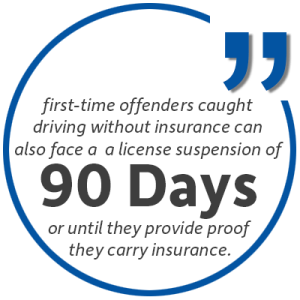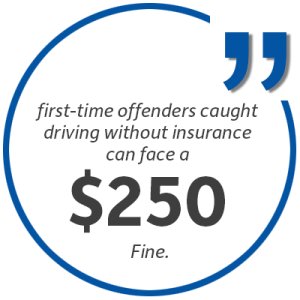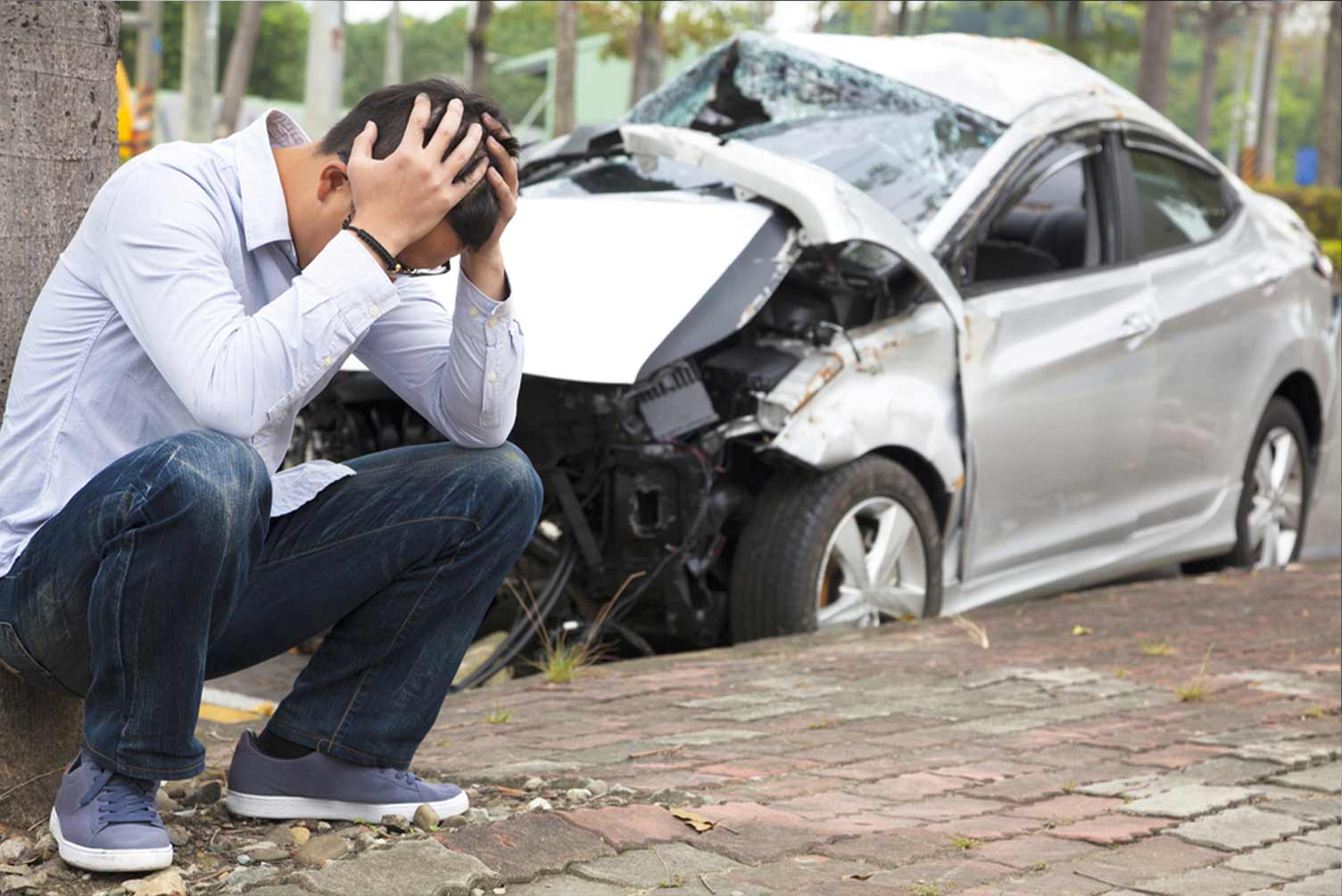Having a valid driver’s license and car insurance are requirements for all drivers in the state of Indiana. However, in certain circumstances, some individuals may find themselves unable to obtain car insurance or are unaware that their insurance has expired.
Operating a vehicle without insurance is already risky, but the repercussions are magnified if you are involved in a car accident without insurance. Individuals may face severe consequences for operating a vehicle without insurance such as license suspension and major fines.
In this blog, we discuss the penalties of driving without car insurance and outline a few tips on what to do if you are in a car accident without insurance in Indiana. We also go over your options if you are hit by a driver without insurance. But first, let’s talk about the requirements for carrying auto insurance in Indiana.
Indiana Car Insurance Laws
Under Indiana state law, any driver who is at fault when an accident occurred is financially responsible for damages. These damages can include vehicle damage, serious injuries, and lost income. If you caused these damages for another party because you were at fault for an accident, your auto insurance pays out the damages to the other driver.
In no fault states, each driver would file a third party claim to get their own insurance company to pay for damages to their own vehicle. However, insurance coverage in Indiana is based on our status as an at-fault state.
Even without Indiana’s requirement to carry car insurance, you can see why it is a good idea for every driver to carry auto insurance! The coverage protects you from being personally responsible for serious medical bills, missed work, and property damage costs of the other driver or their passengers as you would in a no-fault state.
When you look at it that way, you can see why Indiana would require car insurance! It’s a rule that protects everyone. It protects you from bankruptcy because you can’t cover the costs of the damage you caused, and it protects the victim from terrible financial consequences that were no fault of their own.
List of Indiana Driver’s Insurance Requirements
In Indiana, drivers are required to have the following coverage as part of their car insurance policy:
- Bodily injury liability coverage: Minimum of $25,000 per person and $50,000 per accident for medical bills
- Property damage liability coverage: Minimum of $25,000 per person for personal assets and vehicle repairs
- Uninsured motorist bodily injury coverage: Minimum of $25,000 per person and $50,000 per accident
Other states in the country make uninsured motorist bodily injury coverage optional, but as you can see, it is required in the state of Indiana. Uninsured and underinsured motorist coverage protects you if you were in a crash and a driver who was uninsured was at fault for the accident.

Although uninsured motorist coverage is required, policyholders can reject this coverage in writing.
When you carry the minimum car insurance required, you can rest assured that you are legal to operate a motor vehicle in the state. However, the minimum required auto insurance coverage may not be enough to cover the damages associated with severe injuries or property damage.
Carrying the minimum keeps you legal, but it may make you vulnerable to a lawsuit.
Maintaining Proof of Insurance
Indiana drivers are legally obligated to maintain up-to-date proof of insurance. Drivers need to retain proof using a certificate of insurance (COI), a statement provided by automotive insurance companies that confirms that a driver is insured.
Indiana residents should keep these certificates within their vehicles in case of a traffic stop or car accident, and they also need to ensure that this proof of insurance isn’t expired.
Penalties for Driving Without Insurance in Indiana

When states require insurance for motor vehicles, they implement penalties for driving without insurance. Indiana does require car insurance.
Indiana’s insurance laws state that first-time offenders caught driving without insurance can face a $250 fine as well as a license suspension of 90 days or until they provide proof they carry insurance. To regain your license, you must prove that you have adequate car insurance from a legitimate car insurance company to drive.
If you drove without the minimum required liability insurance, property damage insurance, or UMI, you’ll need to supply proof of future financial responsibility (SR-22). SR-22 forms are certificates that prove that you meet minimum car insurance requirements within your state. Your SR-22 will need to show proof of financial responsibility for three years after the date of your license reissue. For example, if road authorities reinstate your license on August 1, 2023, you’ll need to show proof of financial responsibility up until August 1, 2026.
Subsequent Offenses
There are different legal consequences for secondary offenses for failing to meet minimum coverage requirements. Second-time offenders caught driving without insurance within a five-year period may face up to $1,000 in fines or jail time and will also need to provide proof of insurance to re-obtain their license.
Additionally, their vehicle registration may be suspended for up to a year. They will then have to provide proof of financial responsibility (the same SR-22 form) for three years following the date of the offense.
If someone is caught driving without a license for the third time within five years, their license may be suspended for an entire year. At the end of the one-year period, a driver will have to pay a $1,000 reinstatement fee to get their license back, and their vehicle registration will be suspended for a year. They will then be required to obtain an SR-22 certificate for the following five years.
How to Avoid a Lapse in Coverage

Letting your auto insurance lapse, even for a short period, can have severe consequences if you get into a car crash while uninsured. It’s essential to take steps to ensure your coverage remains active and up-to-date.
Here are some tips to help prevent gaps in your insurance:
- Set up automatic payments: Most insurance companies allow you to set up automatic recurring payments from your bank account or credit card.
- Set up payment reminders: If you choose to pay manually, set up calendar reminders or alerts on your phone for a week or two before your premium is due.
- Monitor your insurance policy for rate increases: Insurance rates can creep up over time. Review your policy costs periodically and shop around for better rates from other providers. You may be able to find equal or better coverage for less.
- Increase your deductible if necessary: Raising the deductible amount on your policy even slightly can lower your monthly premium payments and make them more manageable.
- Pay in full yearly if possible: Many insurers offer a discount if you pay your entire annual premium upfront rather than monthly installments.
- Bundle your insurance policies: Often you can get discounts from insurers by bundling auto insurance with homeowners, renters, life, or other policies.
The consequences of a lapse, even for a day, are severe – suspension of license, fines, and personal liability if in an accident. Take proactive measures to not face penalties and avoid falling into the uninsured driver category.
What if I Hit Someone and I Don’t Have Insurance?

Since Indiana is an at-fault state, they require drivers to pay for all damages if you hit someone else and you do not have insurance coverage.
Usually, in car accident lawsuits, injured parties file against insurance companies that are unwilling to pay out full damages for the victim’s economic and noneconomic damages. When the at-fault driver doesn’t have car insurance, the injured party files against the uninsured driver directly.
Uninsured drivers found liable will be responsible for paying for the victim’s damages. If they can’t afford to pay, the court may garnish their wages.
After a car accident, you may responsible for:
- Medical expenses
- Property damage
- Car repairs
- Lost wages
- Pain and suffering
Without car insurance, you’ll be personally liable for any vehicle damages and medical costs after the accident in question, so you must collect any evidence that may indicate that another party was partially responsible for the wreck.
How to Prove Damages
Even if you are at fault for the car accident without insurance, always take plenty of pictures of the accident including both vehicles as well as road conditions and other damages. These pictures can serve as powerful evidence that may reduce the damages you’ll be required to pay or put responsibility on the other driver’s insurance.
The damages you may be responsible for vary depending on the specifics of the accident. If the other driver was even partly responsible, your obligation will be less than if you were 100% at fault for the accident.
After an accident, schedule a free consultation with our team, dial (317) 401-8626 today or contact us online.
What to Do After an Accident If You Don’t Have Insurance
If you are a driver involved in an accident in Indiana while driving without insurance, it’s crucial to take the proper steps right away to protect yourself legally and financially.
Here are the key things you should do:
- Move to a safe area if possible and call 911 if there are any injuries. Render first aid if needed until emergency responders arrive.
- Exchange contact, the driver’s insurance, and vehicle information with the other driver or drivers involved. Even if you aren’t insured, get their full insurance details.
- Call the police to the scene so they can file an official accident report. Reports for car accidents create important documentation of the incident details.
- Take photos and videos of the accident scene, all vehicle damage, injuries, road conditions, and anything else relevant. Thorough photographic evidence can help determine fault.
- Get contact information from any witnesses who saw what happened. Their accounts could help your case.
- Don’t admit fault or make any statements about insurance coverage. Avoid discussing the accident except to provide factual information the police for their official police report.
- Seek medical attention right away, even if you feel fine. Some injuries aren’t immediately apparent! Establishing a record of any harm is vital to create a baseline for your injuries.
Indiana’s No Pay, No Play Statute
The No Pay, No Play statute means that if a driver doesn’t have car insurance and was required to provide proof of financial responsibility (SR-22) in the last five years, they cannot recover non-economic damages from an at-fault driver, even if that driver is insured.
This is because uninsured drivers face legal consequences beyond just losing their driver’s license or paying a fine. The long-term implications of driving without insurance are serious!
These drivers cannot recover damages including pain and suffering, physical impairment, mental anguish, loss of enjoyment of life, and other non-economic damages.
What if I’m Hit by an Uninsured Driver?
If you have insurance compliant with Indiana state law requirements, you likely have uninsured motorist insurance (UMI). If you do have UMI and are hit by an uninsured driver, you need to file an uninsured motorist coverage claim with your insurer and provide evidence that the other driver is at fault.
It’s possible that your uninsured motorist coverage won’t cover the full amount of your losses. In that instance, you can file a personal injury lawsuit against the other driver who was driving without insurance.
Always seek medical attention for your injuries first, and always call the police to the scene of the accident so that they can file a report. These police reports often help with your claim approval. If your insurance company fails to pay your claim, you will need to meet with an experienced Indianapolis car accident lawyer.
Crossen Law Firm| Indianapolis Car Accident Lawyer
If you were involved in an accident caused by an uninsured driver, Crossen Law Firm is here for you. You can seek compensation from the driver responsible, and an experienced attorney will make sure that you get justice and collect compensation for the damages you have suffered.
Our Indianapolis personal injury lawyers are equipped with the knowledge and resources to help you with your claim and advocate for your best interest. To save money on fees, we can meet with you for a free consultation to learn about your accident and help you determine the next best steps.
If you were injured by someone else’s negligence, that driver should be held responsible.

 317-401-8626
317-401-8626 
.jpg)